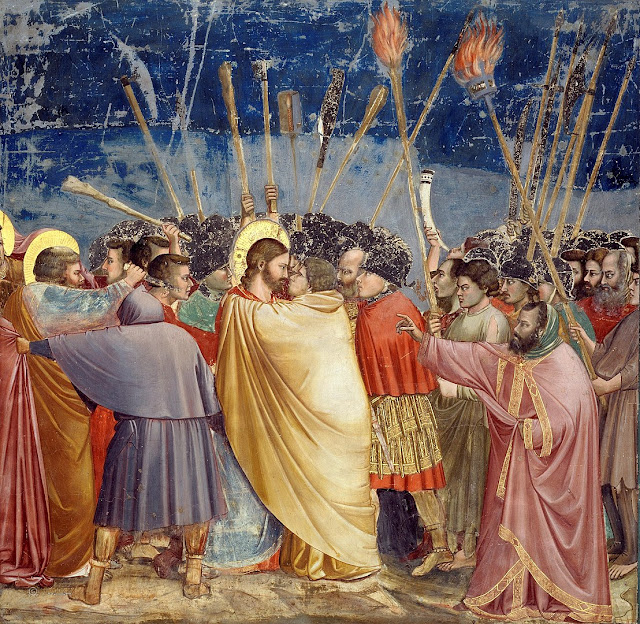How should we view the despair of Judas?
| Kiss of Judas (1304–06), fresco by Giotto, Scrovegni Chapel, Padua, Italy |
Since
we're near the end of the Holy Week, I thought to share my reflections on the
Good Friday, with a special focus on Judas and the controversial topic of
suicide.
Recently,
we have witnessed a tendency of rehabilitating Judas' suicide, and suicide in general,
even by certain theologians in the past and present.
Through
the analysis of this topic, I see the necessity of saying a few words on the
nature of sin, hope, and mercy.
In our
secularized era, the aforementioned concepts might sound as outdated or even
meaningless. So, we should start by questioning the definition of sin.
According to the Compendium of the Catholic Catechism, sin is defined as the
deliberate action which separates one from God.[1] So basically, sin is a 'sui
generis' apostasy, and understanding the pain of despair, our weak human nature,
it is natural to show a kind of compassion. Because at a certain moment of our
lives, we have been like Judas; and all of us seek for [God's] mercy. But can
we agree with the rehabilitation of it? What would be its effect on the
faithful? Would this mean watering down the faith? Or even a total misleading
thought, heresy!?
There's
no need of repeating it, the story of Judas is familiar to each of us. He
betrayed Christ for 30 silver coins, gave him the betrayal kiss, later after
realizing what he had done, fell in despair and committed suicide. With
righteousness, his name has become synonymous with betrayal.
But as
Pope Benedict XVI wrote in his magnum opus Jesus of Nazareth, as well in
other opus, stated that Judas' greatest sin was falling into despair. That was
the stubborn refusal of seeing the light of hope, forgiveness, Christ. That's
why he chose the other way: suicide. Thus, His Holiness doesn't see him as evil
nor dark, rather as „...a sycophant who
bows before the anonymous power of changing moods and current fashions.“
And this is a fact which shouldn't be ignored. [2]
The very opposite of Judas is Simon Peter, the man who not only repent but accepted his weakness; dared to believe and hope of forgiveness, despite his heavy sin of "apostasy“. The best explanation of the Catholic understanding of it, I believe, has shown us the Pope emeritus in his encyclical Spe Salvi: "The one who has hope lives differently; the one who hopes has been granted the gift of a new life."[3] This is an essential thing which we should not forget. Faith in Christ, despite the burden of pain, gives us hope in forgiveness and redemption. Suffering while having hope is what makes us Christians. In the end, as Pope Ratzinger and St. John Paul II have said, that suffering is the only way to the true conversion.[4]
Therefore,
despite the secular critiques, it's quite understandable why the Church has
traditionally considered suicide as a mortal sin and should maintain as such.
It does not matter what some theologians say, it's Biblical – "Thou
shall not kill!" By this, I'm not condemning anyone, because who am I
to do so? Rather, I'm asserting the orthodox way, which is always the safest
road to be taken. Id est, avoiding the sin of presumption. [5]
Going
through the darkness is difficult, but by absolving [Judas] suicide in the name
of mercy, we jeopardize the very essence of Christianity. Such action at the
end leads to corrupting the original meaning of mercy. This is the serious
problem of the postmodern man's understanding of mercy, because it defines it
in an indifferent way, without the necessity of faith or hope, only for the
sake of emotive “niceness”. But without hope, it's impossible to expect mercy,
because in the Christian sense, giving up hope is equal to apostasy, it means
refusing Christ as savior, his cross, and his glorious light: resurrection! That’s
why charity can be found only in the Truth! On the other hand, God's grace,
and salvation are another topic that remains a mystery, but we know the way
towards Heaven. Let us follow and preach it. Oremus!
- Albert Bikaj
_____________________________________________________
[1] “Sin is “a word, an act, or a desire contrary to the eternal Law” (Saint
Augustine). It is an offense against God in disobedience to his love. It wounds
human nature and injures human solidarity. Christ in his passion fully revealed
the seriousness of sin and overcame it with his mercy.” – Compendium of the
Catholic Catechism, 392.
[2] Joseph
Ratzinger, “The mystery of betrayal”, Jesus of Nazareth: Holy Week: From the
Entrance Into Jerusalem To The Resurrection (Ignatius Press: 2011); Co-workers of the Truth: Meditations for
Every Day of the Year (Ignatius Press: 1992), 359.
[3] Pope Benedict
XVI, Spe
Salvi – Saved in Hope (Vatican,
2007), 2. http://www.vatican.va/content/benedict-xvi/en/encyclicals/documents/hf_ben-xvi_enc_20071130_spe-salvi.html.
[4] Pope John
Paul II, Salvifici doloris - On the
Christian Meaning of Human Suffering (1984), 12. http://www.vatican.va/content/john-paul-ii/en/apost_letters/1984/documents/hf_jp-ii_apl_11021984_salvifici-doloris.html.
[5] In the last
year's version of this essay, considering the delicate nature of the topic, I
can say that I had written if not wrong, pessimistically, and even used
uncharitable rhetoric towards His Holiness Pope Francis - for which I've humbly
repented and remorse many times ago.
Thus, having this in mind, I thought to "update" and correct my
mistake. Published at Theosis and CatholicArena.com



Comments
Post a Comment